Professional Weekly Pool Cleaning Service.
The pool service that actually shows up. Get GPS-verified visits, digital photo reports, and CPO-certified care. Finally, a pool maintenance company you can trust.
Rated 4.9/5 by 2,200+ customer reviews
From cleaning to repairs to installations, we've got you covered.
Set your pool on autopilot.
Weekly Pool Service
Comprehensive cleaning, skimming, and vacuuming to keep your water sparkling and debris-free.
Equipment Repair
From pumps and heaters to salt systems, our technicians diagnose and fix issues before they become costly repairs.
Filter Cleaning
Regular filter cleanings to ensure proper flow, sanitation, and crystal-clear water clarity.
A Pristine Pool, Without the Work
Your pool is meant for making memories, not checking chemical levels. Whether you just bought a home with a pool or are looking to upgrade your current service, Cabana provides the reliable, weekly maintenance you need to keep the water healthy, safe, and swim-ready.
We handle the scrubbing, balancing, and equipment checks so you can focus on enjoying your backyard oasis.
Protect Your Family: We maintain precise chemical balance to eliminate germs and prevent skin irritation.
Avoid Surprise Repairs: Regular maintenance catches small issues with pumps and filters before they become expensive breakdowns.
Reclaim Your Weekends: Skip the store trips and net skimming. We do it all so you can simply jump in.
Skip the phone tag. Enter your address to get a custom pool service quote in under 2 minutes.
Comprehensive Pool Care. We Protect Your Investment.
Your pool is a major asset. Improper chemistry can corrode heaters and ruin plaster. Our CPO-certified pool technicians use precise dosing to extend the life of your equipment and keep your water safe for the whole family.
Precise Chemical Balancing: We maintain optimal pH and alkalinity to prevent eye irritation and equipment corrosion.
Precise Chemical Balancing: We maintain optimal pH and alkalinity to prevent eye irritation and equipment corrosion.
Algae Prevention: Proactive water treatment ensures your pool never turns green, even in the heat of summer.
Debris Removal: We skim the surface, brush the walls, and vacuum the floor for a showroom finish.
Equipment Checks: Weekly visual inspections of your pump, motor, and filter to catch issues early.
From cleaning to repairs to installations, we've got you covered.
What's included with our weekly pool cleaning service?
Check & Balance Pool Chemicals
Say farewell to hassle as we balance your pool chemicals for optimum water quality.
Inspect Filter System & Backwash
Clean filters are the secret to an immaculate pool all year long.
Manually Vacuum Pool Surfaces
Nothing can replace a thorough, hand cleaning.
Treat for Algae
Conquer the green with our expert algae treatments.
Clean Skimmer & Pump Baskets
We keep the water flowing freely to help ensure your pool is immaculate.
Empty Catch & Maintain Automatic Pool Vacuum
It’s all about peace of mind that everything’s operating optimally.
Brush Steps & Walls
Regular deep cleaning ensures you have a tranquil oasis.
Skim Water, Clean Leaves, Remove Debris
We leave your pool looking immaculate for worry-free enjoyment.
Detailed Post-Service Report
We detail every step and all our findings so you can make accurate decisions.
From cleaning to repairs to installations, we've got you covered.
What’s Included in Your Weekly Service?
Our comprehensive 8-point cleaning process ensures nothing is missed.
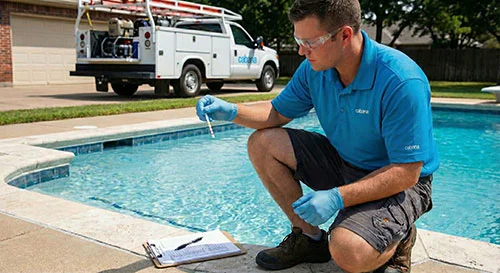
Precision Chemical Balancing
We test and adjust your water chemistry weekly, including pH, chlorine, and alkalinity, to ensure it is sanitary and safe for your family. No more green hair or itchy eyes. Just crystal-clear water.

Filter Cleaning & System Checks
Your filter is the heart of your pool. We routinely inspect pressure gauges and backwash your system to prevent costly equipment burnouts and keep water circulating freely.
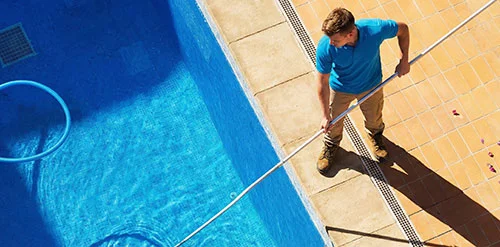
Deep-Clean Manual Vacuuming
Automatic cleaners miss spots. We don’t. We manually vacuum the pool floor when needed to remove fine sediment, sand, and heavy debris that robots leave behind.
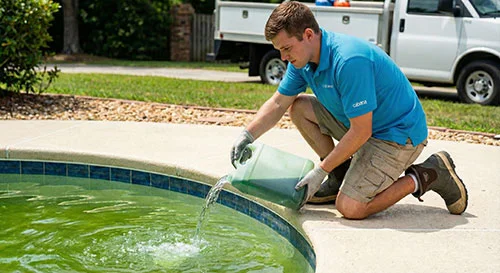
Proactive Algae Prevention
We do not just treat green pools. We prevent them. We apply preventative algaecides and phosphate treatments to stop algae blooms and bacteria before they ever start.

Skimmer & Pump Basket Emptying
Clogged baskets can destroy a pool pump. We empty all skimmer and pump baskets every visit to ensure maximum water flow and protect your expensive equipment.
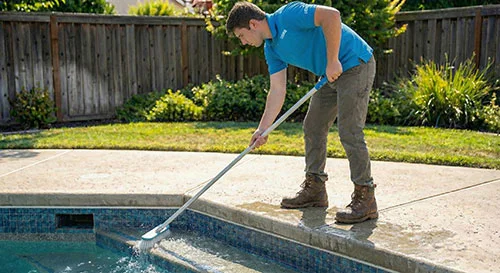
Wall, Step & Tile Brushing
We scrub the walls, steps, and swim-outs to remove biofilm and prevent stubborn algae staining. This crucial step extends the life of your plaster and keeps surfaces smooth.

Automatic Cleaner Maintenance
We manage your robot so you do not have to. We empty catch bags, check hoses, and ensure your automatic cleaner is operating at peak efficiency between our visits.

Surface Skimming & Debris Removal
We net the entire surface to remove floating leaves, bugs, and pollen. We leave your pool sparkling, inviting, and ready for a swim the moment we walk out the gate.
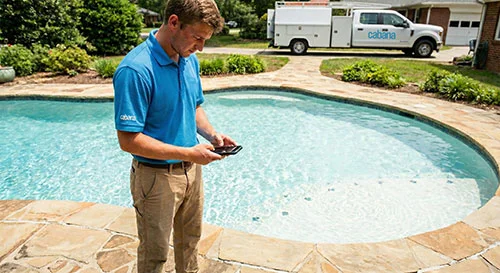
Detailed Post-Service Report
Total transparency. After every visit, you will receive an email with chemical readings, a checklist of tasks completed, and a photo of your pristine pool. Know exactly what you are paying for.
What's included with Weekly Pool Service?
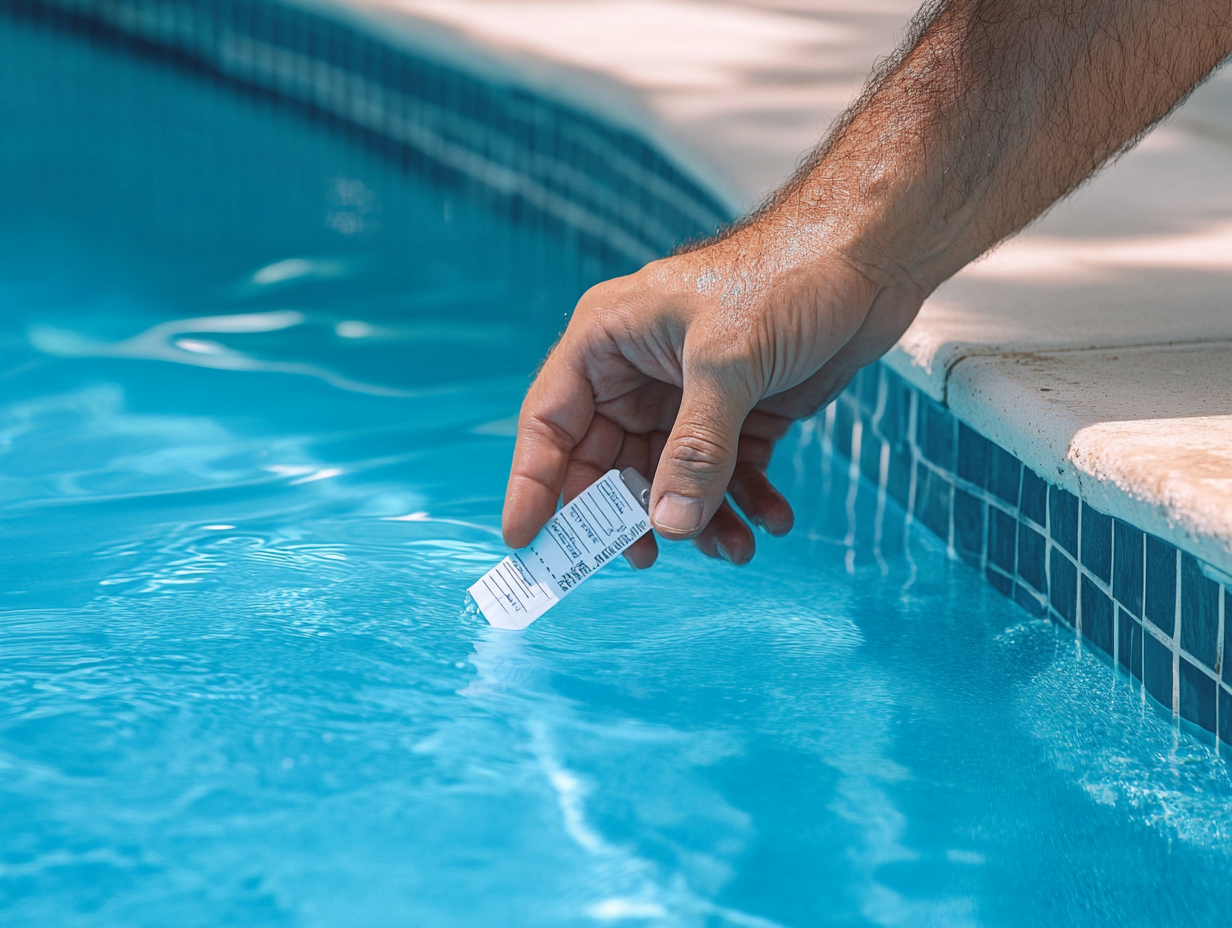
Check & Balance Pool Chemicals
Say farewell to hassle as we balance your pool chemicals for optimum water quality.
Inspect Filter System & Backwash
Clean filters are the secret to an immaculate pool all year long.
Manually Vacuum Pool Surfaces
Nothing can replace a thorough, hand cleaning.
Treat for Algae
Conquer the green with our expert algae treatments.Clean Skimmer & Pump Baskets
We keep the water flowing freely to help ensure your pool is immaculate.Empty Catch & Maintain Automatic Pool Vacuum
It’s all about peace of mind that everything’s operating optimally.Brush Steps & Walls
Regular deep cleaning ensures you have a tranquil oasis.Skim Water, Clean Leaves, Remove Debris
We leave your pool looking immaculate for worry-free enjoyment.Detailed Post-Service Report
We detail every step and all our findings so you can make accurate decisions.
Pool Care, Modernized.
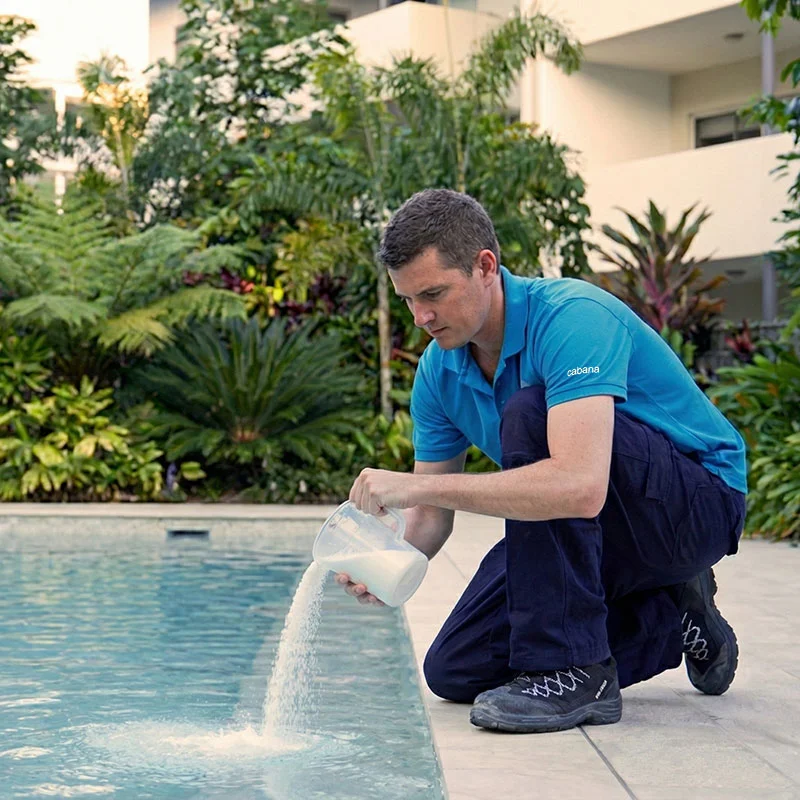
step 1
Get your price instantly
Skip the phone tag and on-site visits. Just enter your address, and we'll generate a custom service plan for your pool in under two minutes.
step 2
Weekly care, with proof
Our vetted pros handle the chemistry, skimming, and scrubbing. The best part? You get a timestamped photo report emailed after every visit, so you know your pool is sparkling clean.
step 3
Enjoy your crystal-clear water
Swim in resort-quality water 24/7, and if you aren't 100% happy with a visit, we’ll always make it right.
The Weekly Pool Service You Need for an Immaculate Oasis
We turn your pool into the sparkling centerpiece of your backyard. Algae, bacteria, and debris are constant threats, but our expert technicians handle them daily. We take the stress out of ownership so you can focus on enjoying the water.
Our goal is to ensure your pool is picture-perfect every day. With our reliable weekly pool service, you never have to worry about skimming leaves or balancing complex chemicals. Reclaim your weekends for family time and let us handle the maintenance.
More Than Just Cleaning: The Value of Weekly Pool Service
We take pride in offering a true "white glove" cleaning experience. However, hiring a professional is about more than just convenience. It protects your assets.
Extend Your Pool’s Lifespan: Consistent cleaning and chemical balancing maintain the ideal pH for your water. This prevents aggressive water conditions that ruin plaster and corrode expensive equipment.
Guarantee Health & Safety: Pool maintenance is not just about looks. Unbalanced water can cause skin irritation and eye redness. We ensure the water is sanitary and safe for everyone who takes a dip.
Your neighbors say it best.



5,000+
Satisfied Customers
Let's get back to swimming.
Give us a call.
Talk with an expert and get a free quote.
Sun – Sat : 8:00 AM – 5:00 PM PST
Get online quote.
Get a fast, free online quote in just 5 minutes.
Need support?
Get your questions answered and connect with one of our experts in just seconds.
Popular Locations
Los Angeles, CAMalibu, CAVenice, CAPacific Palisades, CACulver City, CASherman Oaks, CAChatsworth, CABeverly Hills, CAHidden Hills, CABrentwood, CACalabasas, CAEncino, CAWoodland Hills, CAWestlake Village, CASanta Monica, CAPasadena, CAGlendale, CARolling Hills Estates, CAArcadia, CALa Canada Flintridge, CAWest Hills, CABel Air, CAHollywood Hills, CAManhattan Beach, CAWest Hollywood, CAPalos Verdes Estates, CARancho Palos Verdes, CALong Beach, CARedondo Beach, CAAgoura Hills, CABurbank, CAMar Vista, CAEl Segundo, CAPlaya Vista, CAPlaya Del Rey, CAMarina Del Rey, CASilver Lake, CAStudio City, CAInglewood, CATorrance, CA